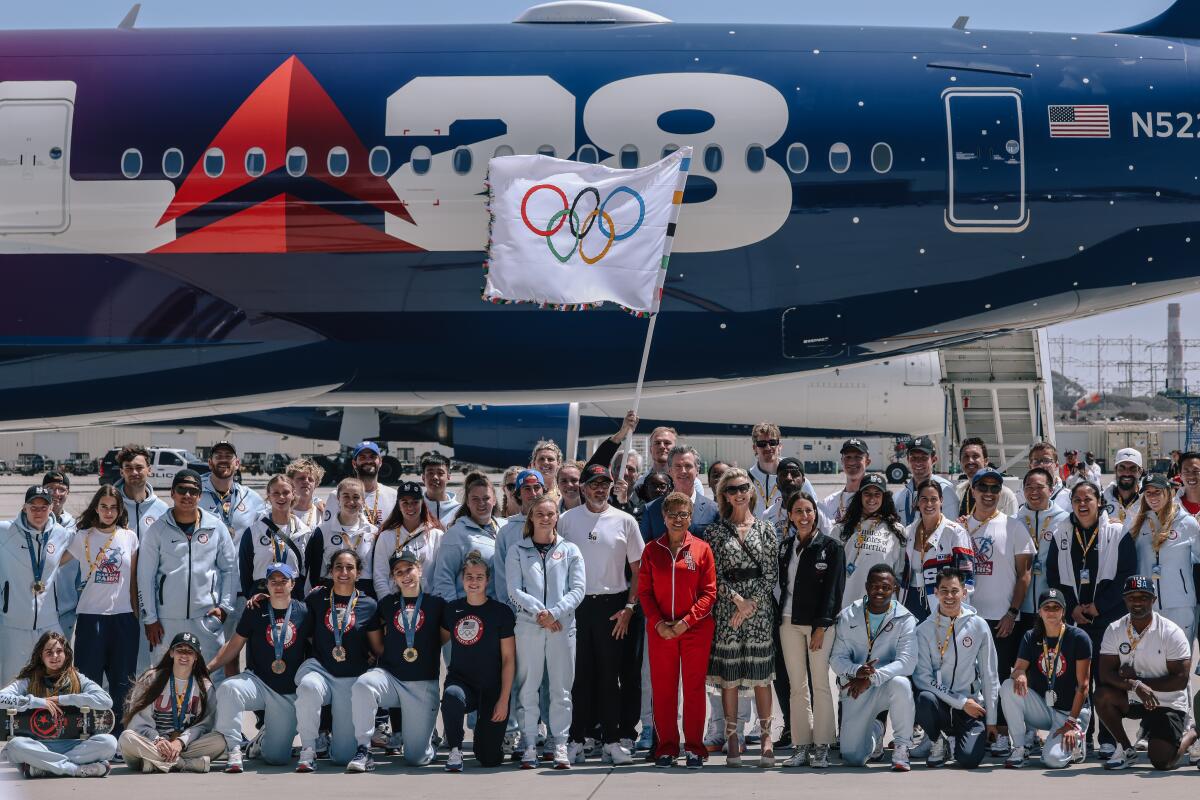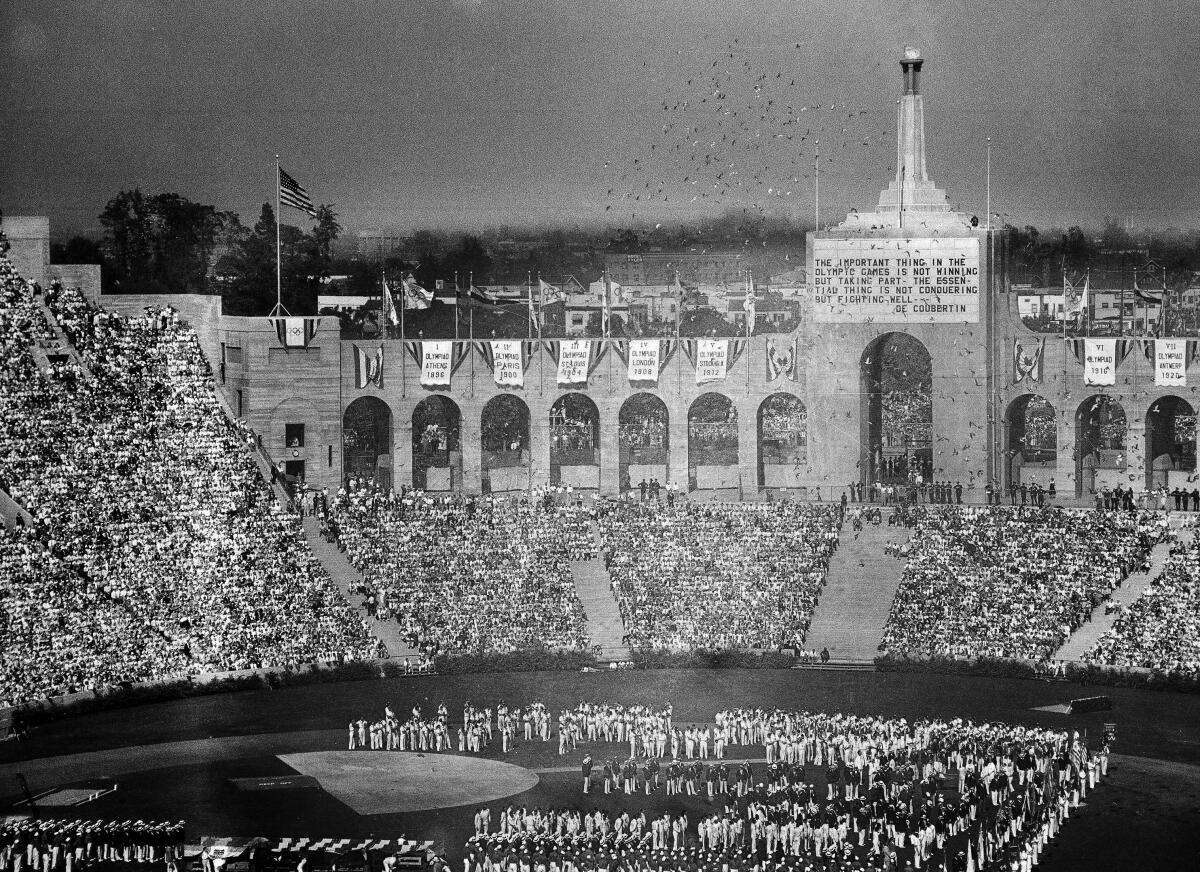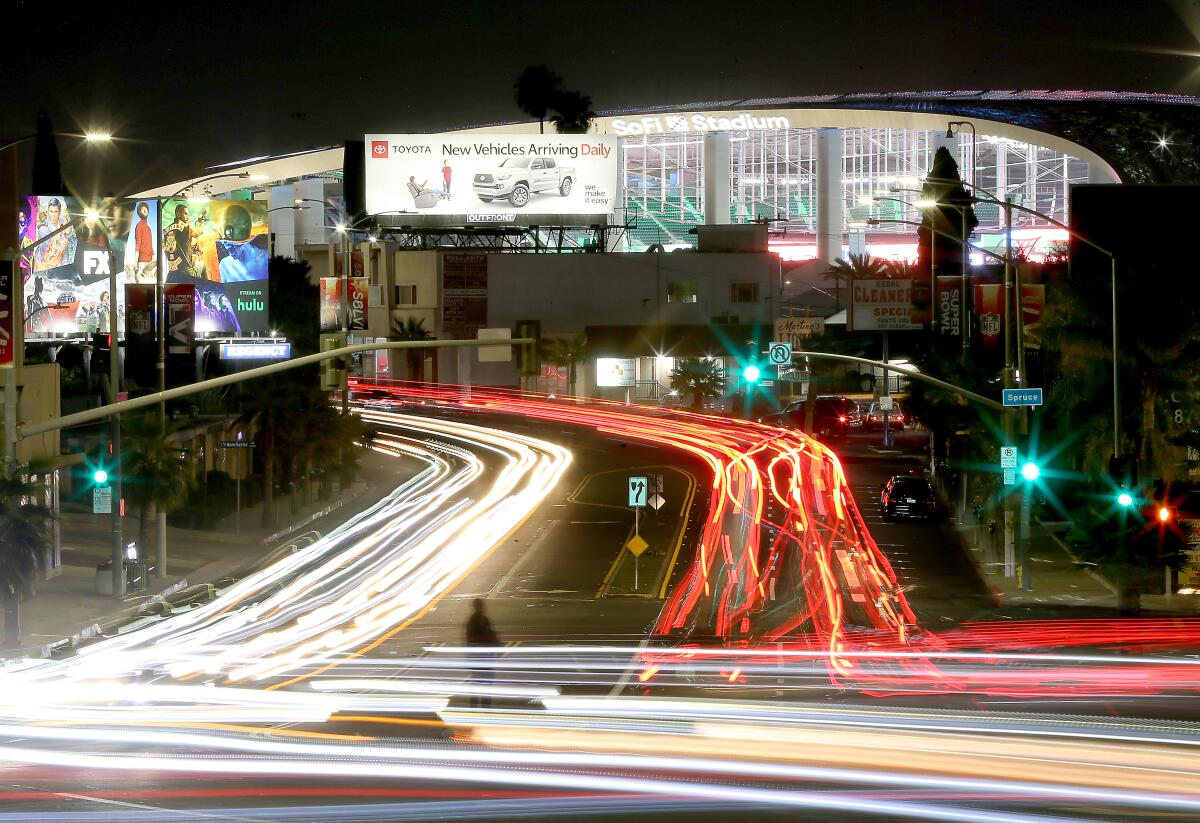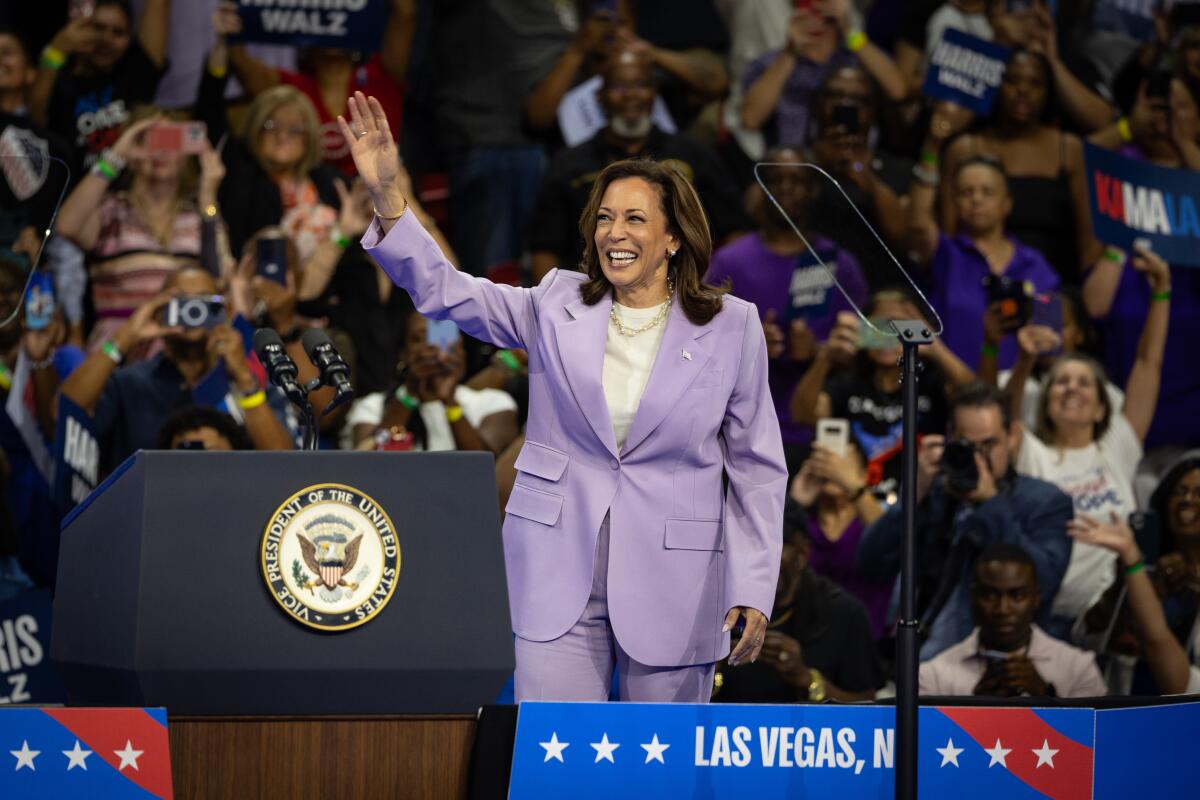How the 2028 Olympics could actually break L.A.’s car dependency

- Share via
Good morning. It’s Wednesday, Aug. 14. Here’s what you need to know to start your day.
- L.A. promises a car-free 2028 Olympics. We’ll see about that!
- Harris and Walz’s campaign builds a huge lead among likely California voters.
- Find hootin’-hollerin’ allure at Knott’s Berry Farm’s summer staple Ghost Town Alive.
- And here’s today’s e-newspaper
You're reading the Essential California newsletter
Our reporters guide you through our biggest news, features and recommendations every morning
You may occasionally receive promotional content from the Los Angeles Times.
Car-free L.A. Olympics? The city has a plan for that.
When the Olympic flag passed from Paris to Los Angeles, Mayor Karen Bass reiterated the pledge that L.A. would host a “no-car Games” in four years.
That will require getting millions of people to take public transit instead of driving during 2028’s Olympic and Paralympic Games. That’s how Paris tried to keep the city running smoothly this summer.
But L.A.’s rail network pales in comparison to the City of Light’s.
I spoke with a Metro official and local transit advocates to see whether a car-free (or even car-lite) Olympics is possible.
L.A.’s 1932 and 1984 Olympics were actually pretty car-free

In 1932, Los Angeles boasted one of — if not the best — transit network in the world. Spectators were encouraged to take the popular red car system to venues and the city operated more buses on dedicated roadways.
By 1984, freeways and wide streets had replaced that impressive rail network. But the feared Olympic traffic apocalypse never materialized. Instead, the streets were an “automotive nirvana,” one L.A. Times reporter wrote at the time.
One big reason: The city deployed a massive fleet of buses on dedicated lanes to take spectators and workers to venues.
Congestion on many local roads fell. Fast, frequent bus service helped defeat soul-sucking traffic. But those bus-only lanes were removed when the Olympics left town.
Transit advocates hope that this time, the Olympics can help usher in permanent changes.
A ‘catalytic moment’ to change L.A.’s car culture
L.A. aims to have key projects ready before the 2028 Games arrive. That includes finally bringing rail service directly to LAX, extending the D Line subway further into West L.A. and adding bus-only lanes on highly congested corridors.
Laura Raymond, the director of Act-LA, which advocates for transit and housing improvements, told me she’s hopeful the Olympics represent a “catalytic moment” for L.A. to build itself out of car dependence.
“We need to make sure [the Olympics] is benefiting Los Angeles and not the other way around,” she said.
Creating more permanent bus-only lanes will be key to achieve that, Raymond said. So would improvements to the city’s crumbling sidewalks, inequitable tree canopy and deep deficiency of public bathrooms.
The car-free goal is “appropriate and audacious and awesome,” Alissa Walker told me. Walker has reported on transportation in Los Angeles for 20 years and recently launched Torched, a newsletter chronicling L.A.’s road to the 2028 Olympic Games.
“It’s a really good way to start framing not just how we plan for this big party in ‘28, but how we think about how we want to get around our city every day,” she said. “Fewer cars is really the only path we have forward as a region.”
But Walker worries that some of the public and private money pouring into L.A. ahead of the Games won’t actually help achieve long-term mobility goals.
“People are going to use this ‘car-free’ label to try to sell their ideas,” she said, pushing “solutions we didn’t ask for.” Two examples she’s keeping an eye on: air taxis and autonomous vehicle fleets.
Car-free is in the eye of the beholder.
Olympics organizers will be using cars and trucks to move athletes, coaching staff, International Olympic Committee officials and equipment.
“Some venues will have ample parking, others will not,” The Times’ David Wharton reported last week. “Organizers say no one will be told they cannot drive to a competition, but public transportation might be an easier option.”
Some L.A. leaders have adjusted their language to frame the Olympics as “transit-first,” which is different from car-free, Walker noted in a recent edition of her newsletter.
According to Seleta Reynolds, Metro’s chief innovation officer, the agency and its regional transit partners “are absolutely focused” on getting Olympic spectators and workers to and from venues without cars.
Since several major Olympic venues don’t have direct connections to rail, Metro will once again turn to the humble bus to close gaps and get people to events, many of which will be inaccessible by car because of security protocols. The agency plans to borrow about 2,700 buses — in effect doubling its current fleet — and add temporary bus-only lanes to a number of freeways during the Games.

“We know that’s not enough,” she said. The agency also aims to expand bike lanes, create “mobility hubs” where people can switch from cars to other modes of transportation and make the system easier to navigate for foreign tourists.
Metro is no stranger to cost overruns, construction delays and other roadblocks that stretch project time lines.
The agency proposed in 2018 28 transit projects to complete by 2028. But the list has been amended and scaled back over the years.
Five projects have been completed, nine are under construction, and the remaining projects are in some phase of planning.
The agency’s “real north star” for the next four years, Reynolds said, is a separate “wish list” of transportation and mobility improvements.
But it still needs about $3 billion to close a funding gap, Reynolds said. It has secured $17 billion already.
While securing funding and community buy-in remain big hurdles, Reynolds said, coordination between siloed agencies “has always bedeviled us.”
She hopes that the Olympics can change that by giving the government bureaucracies that manage transportation in L.A. County a common goal to strive for.
“This deadline is fixed,” she said. “The Games are coming.”
Today’s top stories

Kamala Harris leads the polls in California
- Poll: Harris and Walz build huge lead among likely California voters.
- As a Minnesota ‘climate champion’, Gov. Tim Walz looked to California for inspiration.
- Harris offers ‘freedom’ and contrast to Trump, but not many policy details.
- Trump, meanwhile, promises to ‘save’ America with mix of lofty, vague, legally dubious policies.
Earthquake
- A dangerous L.A. fault system rivaling the San Andreas is tied to recent earthquakes.
- Some danced, some ducked and covered, others evacuated when quake jolted L.A. schools.
- Here’s how to get California’s early warning earthquake alerts.
Excessive heat, hydrogen cars and climate
- Death Valley National Park claimed another life in blistering summer heat.
- Refueling a hydrogen car in California is so annoying that drivers are suing Toyota.
- Billionaire accused of stealing sand from Malibu’s Broad Beach, lawsuit says.
Pro-Palestinian protesters
- San Francisco’s district attorney brought charges against pro-Palestinian protesters who blocked Golden Gate Bridge.
- Pro-Palestinian protesters shut down 405 Freeway in West L.A.
- A judge ordered UCLA to ensure equal campus access to Jewish students after pro-Palestinian protests
More big stories
- Thousands are housed as L.A. County makes progress on Skid Row.
- Paramount shutters television studio, begins major layoffs ahead of Skydance merger.
- Human Rights Watch slammed L.A. and California for criminalizing homelessness
Get unlimited access to the Los Angeles Times. Subscribe here.
Commentary and opinions
- Mary McNamara: How Kamala Harris and the Paris Olympics saved us from a summer of doomscrolling.
- Mark Z. Barabak: What Trump’s crowd obsession says about him — and the race for the White House.
- LZ Granderson: We know the sort of policies Harris will promise. The question is how she’d pay for them.
- Jonah Goldberg: Trump turned politics into reality TV. Now Harris is the show to watch.
- Jackie Calmes: Donald Trump’s state of mind should be under debate.
- Michael Hiltzik: Trump says Harris stole his idea for exempting tips from tax, but her version beats his.
- Sammy Roth: Don’t worry, it was only the second-hottest month ever.
Today’s powerful reads

Demand for off-brand Ozempic and other weight-loss drugs is skyrocketing. But are they safe? As consumers seeking to lose weight face Ozempic shortages, many are turning to a booming, less regulated market for compounded versions of the drug.
Other great reads
How can we make this newsletter more useful? Send comments to essentialcalifornia@latimes.com.
For your downtime
Going out
- 🎩 The hootin’-hollerin’ allure of Knott’s Berry Farm’s summer staple Ghost Town Alive!
- 🎨 The woman who forged her path producing “Heathers,” “Edward Scissorhands” and “Beaches” turned to painting as a form of solace after her husband died. A new gallery show is part of that healing.
Staying in
- 🎤 Chappell Roan can’t be stopped.
- 🧑🍳 Here’s a recipe for Sesame Cold Noodles With Crab and Crunchy Vegetables.
- ✏️ Get our free daily crossword puzzle, sudoku, word search and arcade games.
And finally ... a great photo
Show us your favorite place in California! We’re running low on submissions. Send us photos that scream California and we may feature them in an edition of Essential California.
Today’s great photo is from Al Seib for The Times, capturing transitional kindergarten student Sarai Matel’s excitement as she flashes a peace sign while entering Main Street Elementary School in Los Angeles on the first day of school.
Have a great day, from the Essential California team
Ryan Fonseca, reporter
Defne Karabatur, fellow
Andrew Campa, Sunday reporter
Kevinisha Walker, multiplatform editor and Saturday reporter
Christian Orozco, assistant editor
Stephanie Chavez, deputy metro editor
Karim Doumar, head of newsletters
Check our top stories, topics and the latest articles on latimes.com.
Sign up for Essential California
The most important California stories and recommendations in your inbox every morning.
You may occasionally receive promotional content from the Los Angeles Times.





